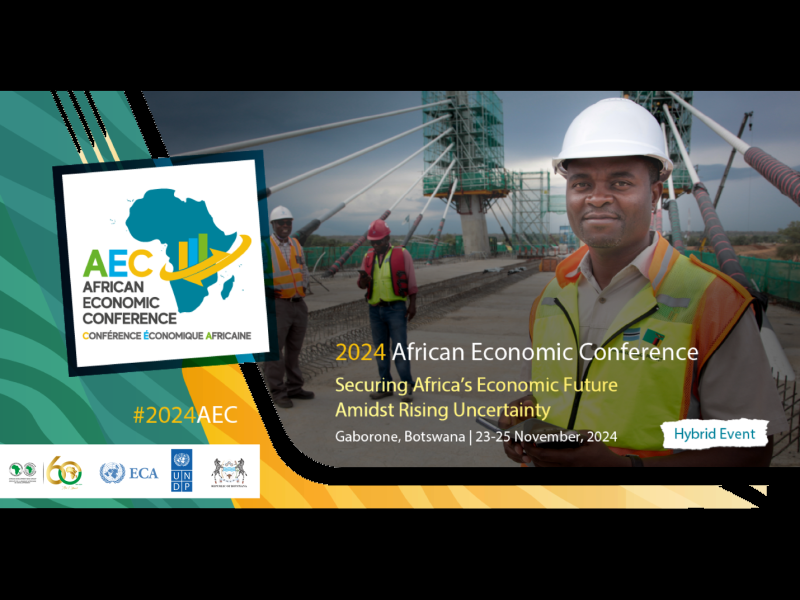Gaborone, 23 November 2024 - Africa’s economic success and sustainability are intrinsically linked to accountable governance, Botswana’s new President, Duma Boko, stressed at the 2024 African Economic Conference that opened today in Gaborone under the theme, "Securing Africa’s Economic Future Amidst Rising Uncertainty."
“Peace and stability in Africa must be anchored on accountable and responsive governance,” the president said adding, “This is a fundamental human right for every African citizen. It sets the requisite bedrock for any form of measure for our economic development and its sustainability.” He also called on African countries to strengthen democracy and uphold the rule of law.
President Boko underscored that transparency, accountability, and respect for the rule of law are critical in attracting foreign investment and fostering sustainable growth. “Africa is at a crossroads,” he said. “We must confront the obstacles facing our citizens and leverage our collective strengths to secure a prosperous future amidst a volatile global economic environment characterized by rising inflation, supply chain disruptions, and tightening monetary policies.”
The three-day conference brings together leaders, policymakers, and experts to address the continent’s economic challenges and opportunities. Organised by the Government of Botswana, the African Development Bank , the United Nations Economic Commission for Africa (ECA), and the United Nations Development Programme (UNDP), the event seeks actionable solutions for Africa’s economic growth.
Innovative Financial Solutions for Growth
“Global uncertainties challenge us to rise above prevailing circumstances and invest in the Africa we want – which is the Africa the world needs: a continent characterized by shared prosperity, productive regional integration, vibrant and entrepreneurial youth, and freedom from fear, disease and deprivation,” underscored UN Assistant-Secretary General and UNDP Africa Director Ahunna Eziakonwa.
Ms Eziakonwa also called for innovative and sustainable financial solutions to reduce borrowing costs and address credit rating biases, which cost the continent $76 billion annually. “We must stem illegal flows where $90 billion is lost. Tens of billions of pension funds, sovereign wealth funds, and insurance funds must work for the continent rather than elsewhere. This Conference must go beyond diagnosing challenges and should lead to actionable solutions. We must take steps to ensure that Africa’s abundant resources finance its growth.”
The co-organisers also underscored Africa’s unique endowments, including its abundant natural resources and youthful population, which could drive transformative growth if governments prioritise education, skills development, and value addition for raw materials.
Addressing Africa’s Economic and Social Challenges
The United Nations Under-Secretary-General and Executive Secretary of ECA, Claver Gatete, said Africa faced several pressing issues, including climate change, unsustainable debt, and systemic global inequalities. The global financial system is failing to serve Africa adequately and needs to be urgently reformed, he said.
Gatete highlighted that the continent’s annual losses from climate disasters alone are as high as $440 billion, while the financing gap to achieve the Sustainable Development Goals in Africa has surged to $1.3 trillion annually. At the same time, Africa’s external debt surpassed $1 trillion in 2023, with unsustainable interest payments restricting development financing.
"The human cost is equally staggering. Nearly 476 million Africans live in poverty today, with 149 million falling into this bracket recently due to cascading climate and economic shocks,” Gatete said.
Regional reforms and integration are critical
President Boko encouraged African nations to leverage the African Continental Free Trade Area to transform the continent’s economic landscape through increased investment, job creation, and industrialisation.
“We must not allow the uncertainties of today to deter us from the opportunities of tomorrow,” he told participants.
Chief Economist and Vice-President of the African Development Bank Prof. Kevin Urama, urged African countries to adopt innovative, homegrown solutions tailored to its unique challenges. He advocated for strengthened fiscal policies and more resilient resource mobilization to address debt challenges.
For interviews and media inquiries, please contact:
-
UNDP: Eve Sabbagh, Strategic Communications Specialist, eve.sabbagh@undp.org
-
African Development Bank: Emeka Anuforo, Communication and External Relations, media@afdb.org
-
ECA: Sophia Denekew, Media Relations, denekews.uneca@un.org
